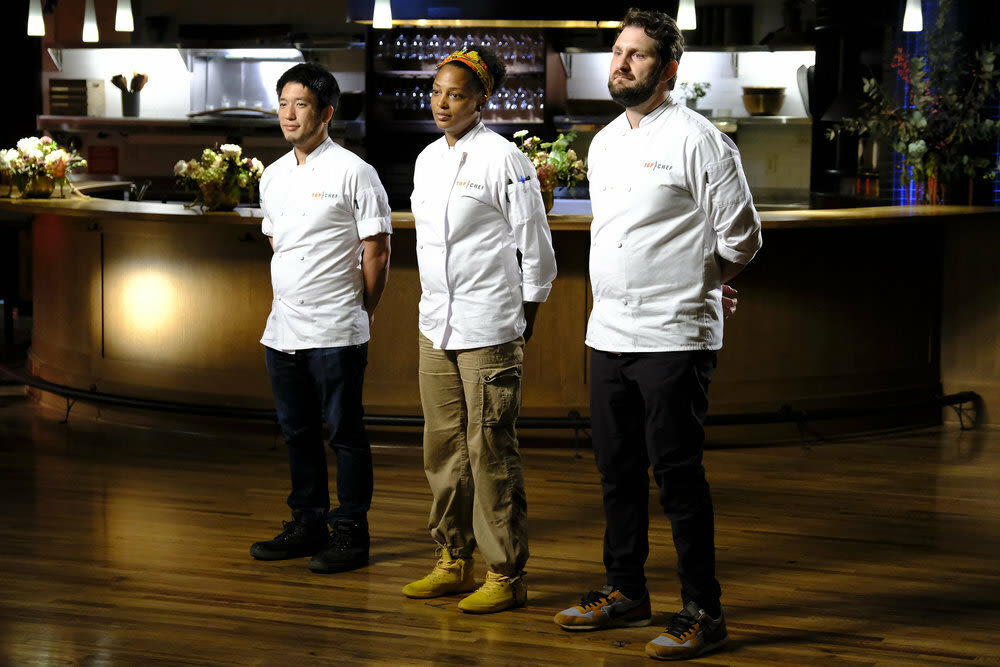‘Top Chef’ Season 18 Finale Recap: A Winner Is Crowned, but the Ending Is Complicated

Shota, Dawn, and Gabe at the final judges' table
Image: Courtesy David Moir/Bravo
In last night’s episode, all three chefs—Dawn, Shota, and Gabe—were tasked with cooking the best four-course meal of their lives. All the chefs were impressive, with mistakes here and there: Dawn with too many components for her first course that she couldn’t all get on the plate, Shota with undercooked rice, Gabe with burnt mushrooms. And then a winner was chosen: Gabe Erales.
I’m glossing over the food and skipping the suspense because it doesn’t seem right to talk about who cooked what and who deserved to win in light of Erales's alleged history of sexual misconduct referred to by Padma Lakshmi on Twitter after the finale aired.
As someone who has been sexually harassed, this topic is a serious one and merits openness.
— Padma Lakshmi (@PadmaLakshmi) July 2, 2021
We filmed Top Chef in October of last year & were not aware of the allegations now coming out about Gabe.
This should be investigated & the network should consider its best action.
To be clear, though, these allegations are not just now coming out. On December 16, 2020, Eater Austin posted a story about Erales’s dismissal from Comedor, the Austin restaurant where he had been executive chef. The article quotes an email from Comedor partner Philip Speer, which stated that Erales was discharged due to “repeated violations of our policies and for behavior in conflict with our values.”
An article published in the Austin American-Statesman on July 2 paraphrases what they say Erales told the paper was the reason for his dismissal.
“Erales admitted to having a consensual sexual relationship with a female member of his kitchen staff in the summer of 2020—and then cutting her hours in November after he returned from taping the culinary king-making show in Portland in September and October,” the article states. “Erales said he cut the hours of the woman based on her performance, though Comedor chef-partner Philip Speer told the American-Statesman he did not deem the woman's work as sufficient reason for hours being cut.”
Further, the American-Statesman states that an anonymous source “close to 'Top Chef,'” was made aware of Erales’s departure from Comedor in December 2020—but chose not to recut the season. The Washington Post's coverage on the same issue also includes an anonymous source, in this case "a person familiar with the production," who told them "members of the production team were aware of Erales’s firing."
Look, I get that filming was done before Erales was kicked out. But if it's true they knew, the network had over six months to edit the show or add a statement to the finale. Pretending like nothing happened despite published reports to the contrary is a serious misstep for Top Chef. It’s especially disheartening to see after last summer’s restaurant world reckoning—including in Portland—around racial injustice and sexual harassment and assault within the restaurant industry. It’s also disappointing to see after a season that, at least on its face, tried hard to get things right: visiting Portland’s pan-African restaurants, cooking meals for medical staff and first responders, learning about Oregon’s Indigenous food cultures. We saw many of the contestants supporting each other selflessly, which rarely happens on American reality TV (see Jamie attempting to give up her spot for Maria).
But as this season has proven, reality TV isn’t immune to the realities of the restaurant industry, which frequently include sexual harassment and misconduct in the workplace. According to one report, more than a third (37 percent in fact) of all sexual harassment claims to the Equal Employment Opportunity Commission (EEOC) come from the restaurant industry, although only seven percent of American women work there. If the producers had chosen to edit the finale and make a statement about sexual harassment in the industry, or had begun the process of stripping Erales of the title and prize money—or at least investigating whether they should, and letting us know where that led—this could have been the most powerful season of Top Chef in the show’s history. But anointing Erales without any acknowledgement of or investigation into the allegations does a disservice to the women who worked for him, and to all workers in the restaurant industry—as well as to all women.




